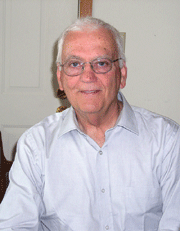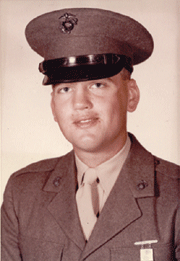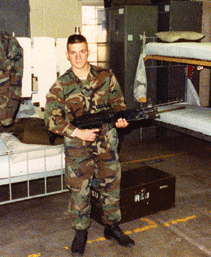Jim Campanella
Marine may have one of the original Iwo Jima flag-raising photos
By Bob Staranowicz
BucksLocalNews.com correspondent
“When I first saw those Marines marching in New York in 1942, I knew then that I wanted to be a Marine.” Jim Campanella had traveled to Grumman, Long Island, from his home in Montclair, N.J., to apply for a job at an Aircraft Company. After seeing the Marines, he went back to New York the next day and enlisted in the Corps. Because he had two cavities, however, he was not accepted. Jim went home and borrowed $2 from a neighbor, had his cavities filled and eventually took the Marine Corps oath in August of 1942.
“I worked at a fish market and delivered newspapers before I enlisted,” Jim says, “but after I joined, I was off to Camp LeJune, North Carolina for basic training.”
Jim had spent time in several different areas in the Pacific including Guam, Guadalcanal, Okinawa and Iwo Jima. He was assigned to the 1st Provisional Marine Brigade as a forward observer.
The island of Guam was occupied by the Japanese from Dec. 13, 1941 to July 9, 1944. In July of 1944, regiments of the 1st Provisional Marine Brigade had arrived. Jim was in the second wave of LSTs (Landing Ship). At around midnight on July 26, 1944, the Japanese were trapped on the peninsula and began a suicide attack. Although the Japanese were almost completely wiped out, the Marines still met with very heavy Japanese resistance in the vicinity of the airfield where they fought from caves and bunkers. The peninsula was secured on July 29, 1944. An estimated 3,000 Japanese were lost in the defense of the Orote Peninsula. The invasion cost the United States forces almost 8,000 casualties, including over 1,000 killed. The 1st Provisional Marine Brigade won the Navy Unit Citation for its performance on Guam.
“The worst part of my service came about in Guam when I had to be carried off the battlefield suffering from malaria,” Jim recalls. It didn’t keep him down for long, though.”
Jim was back with his unit in a few days, although he eventually did need treatment again when he returned to the states after the war.
While on the island of Guam, Jim ran into a fellow Marine he recognized from his home town. Carnivale, the only name by which he was known, was eventually killed there.
“I had no idea of his death until I returned home after the war,” Jim says.
Jim recalls another unique story. “I was going on shore and I saw another neighbor from home - Ernest Brunetto - and I handed him a chicken that had been given to me by a local villager and that I had been carrying for a few days since fresh food was hard to get.”
Also while on Guam, Jim was fortunate to be associated for a time with the Navajo Code Talkers. This select group took part in every assault the U.S. Marines carried out in the Pacific from 1942 to 1945. The Code Talkers served in all six Marine divisions, sending messages by telephone and radio in their native language - a code that the Japanese were never able to break. The primary duty of the code talkers was to transmit information on tactics and troop movements, orders and other battlefield communications.
“They would call in coordinates and we would respond with fire,” Jim says.
Jim’s next major assignment was off the island of Iwo Jima serving as a floating reserve on board ship as the Marines raised the American Flag on the island on Feb. 19, 1945. Iwo Jima was not originally part of the strategy but because the Philippines fell so quickly, the U.S. was experiencing a longer-than-expected respite prior to the already planned invasion of Okinawa. After the combat, photographers returned to the ship and had their photos developed. One of them handed Jim a group of pictures. One of those photographs appears to be the original infamous shot of the Marine Corps raising the flag on the island taken by Joe Rosenthal, although that has not been verified.
Jim also participated in the invasion of Okinawa.
“On the night before the invasion, we prayed to the Southern Cross for our Safety.” “Crux,” commonly known as the Southern Cross, is a constellation visible in the Southern Hemisphere and very distinctive.
“We invaded on Easter Sunday, April 1, 1945,” Jim recalls.
The Army had run into stiff opposition so the Marines were being ordered to support them and eventually take the island.
One of the significant highlights of Jim's service was his participation in the ceremony at the surrender of the Japanese Military Forces in the area of Tsingtao, China on the Oct. 25, 1945. Jim still has the certificate signifying that event signed by Maj. Gen. Lemuel C. Shepherd, commander of the 6th Marine Division.
Jim also had four brothers, all drafted and all had seen combat during World War II. His brothers Joe and Leonard served in the Army. His other two brothers, Mike and Bing, were in the Navy.
Jim left the Marines as a corporal after three and a half years of service. He then became a member of American Legion Post 382, The Lt. Vincent J. Russo Post.
Jim is now retired with his wife of more than 60 years, Ann. His daughter, Phyllis Katasak, lives in Buckingham with her husband Denis and son Jim. He also has two other daughters who live in New Jersey.
BucksLocalNews.com correspondent
“When I first saw those Marines marching in New York in 1942, I knew then that I wanted to be a Marine.” Jim Campanella had traveled to Grumman, Long Island, from his home in Montclair, N.J., to apply for a job at an Aircraft Company. After seeing the Marines, he went back to New York the next day and enlisted in the Corps. Because he had two cavities, however, he was not accepted. Jim went home and borrowed $2 from a neighbor, had his cavities filled and eventually took the Marine Corps oath in August of 1942.
“I worked at a fish market and delivered newspapers before I enlisted,” Jim says, “but after I joined, I was off to Camp LeJune, North Carolina for basic training.”
Jim had spent time in several different areas in the Pacific including Guam, Guadalcanal, Okinawa and Iwo Jima. He was assigned to the 1st Provisional Marine Brigade as a forward observer.
The island of Guam was occupied by the Japanese from Dec. 13, 1941 to July 9, 1944. In July of 1944, regiments of the 1st Provisional Marine Brigade had arrived. Jim was in the second wave of LSTs (Landing Ship). At around midnight on July 26, 1944, the Japanese were trapped on the peninsula and began a suicide attack. Although the Japanese were almost completely wiped out, the Marines still met with very heavy Japanese resistance in the vicinity of the airfield where they fought from caves and bunkers. The peninsula was secured on July 29, 1944. An estimated 3,000 Japanese were lost in the defense of the Orote Peninsula. The invasion cost the United States forces almost 8,000 casualties, including over 1,000 killed. The 1st Provisional Marine Brigade won the Navy Unit Citation for its performance on Guam.
“The worst part of my service came about in Guam when I had to be carried off the battlefield suffering from malaria,” Jim recalls. It didn’t keep him down for long, though.”
Jim was back with his unit in a few days, although he eventually did need treatment again when he returned to the states after the war.
While on the island of Guam, Jim ran into a fellow Marine he recognized from his home town. Carnivale, the only name by which he was known, was eventually killed there.
“I had no idea of his death until I returned home after the war,” Jim says.
Jim recalls another unique story. “I was going on shore and I saw another neighbor from home - Ernest Brunetto - and I handed him a chicken that had been given to me by a local villager and that I had been carrying for a few days since fresh food was hard to get.”
Also while on Guam, Jim was fortunate to be associated for a time with the Navajo Code Talkers. This select group took part in every assault the U.S. Marines carried out in the Pacific from 1942 to 1945. The Code Talkers served in all six Marine divisions, sending messages by telephone and radio in their native language - a code that the Japanese were never able to break. The primary duty of the code talkers was to transmit information on tactics and troop movements, orders and other battlefield communications.
“They would call in coordinates and we would respond with fire,” Jim says.
Jim’s next major assignment was off the island of Iwo Jima serving as a floating reserve on board ship as the Marines raised the American Flag on the island on Feb. 19, 1945. Iwo Jima was not originally part of the strategy but because the Philippines fell so quickly, the U.S. was experiencing a longer-than-expected respite prior to the already planned invasion of Okinawa. After the combat, photographers returned to the ship and had their photos developed. One of them handed Jim a group of pictures. One of those photographs appears to be the original infamous shot of the Marine Corps raising the flag on the island taken by Joe Rosenthal, although that has not been verified.
Jim also participated in the invasion of Okinawa.
“On the night before the invasion, we prayed to the Southern Cross for our Safety.” “Crux,” commonly known as the Southern Cross, is a constellation visible in the Southern Hemisphere and very distinctive.
“We invaded on Easter Sunday, April 1, 1945,” Jim recalls.
The Army had run into stiff opposition so the Marines were being ordered to support them and eventually take the island.
One of the significant highlights of Jim's service was his participation in the ceremony at the surrender of the Japanese Military Forces in the area of Tsingtao, China on the Oct. 25, 1945. Jim still has the certificate signifying that event signed by Maj. Gen. Lemuel C. Shepherd, commander of the 6th Marine Division.
Jim also had four brothers, all drafted and all had seen combat during World War II. His brothers Joe and Leonard served in the Army. His other two brothers, Mike and Bing, were in the Navy.
Jim left the Marines as a corporal after three and a half years of service. He then became a member of American Legion Post 382, The Lt. Vincent J. Russo Post.
Jim is now retired with his wife of more than 60 years, Ann. His daughter, Phyllis Katasak, lives in Buckingham with her husband Denis and son Jim. He also has two other daughters who live in New Jersey.
Labels: Buckingham, Marines, WWII
 RSS Feeds
RSS Feeds







